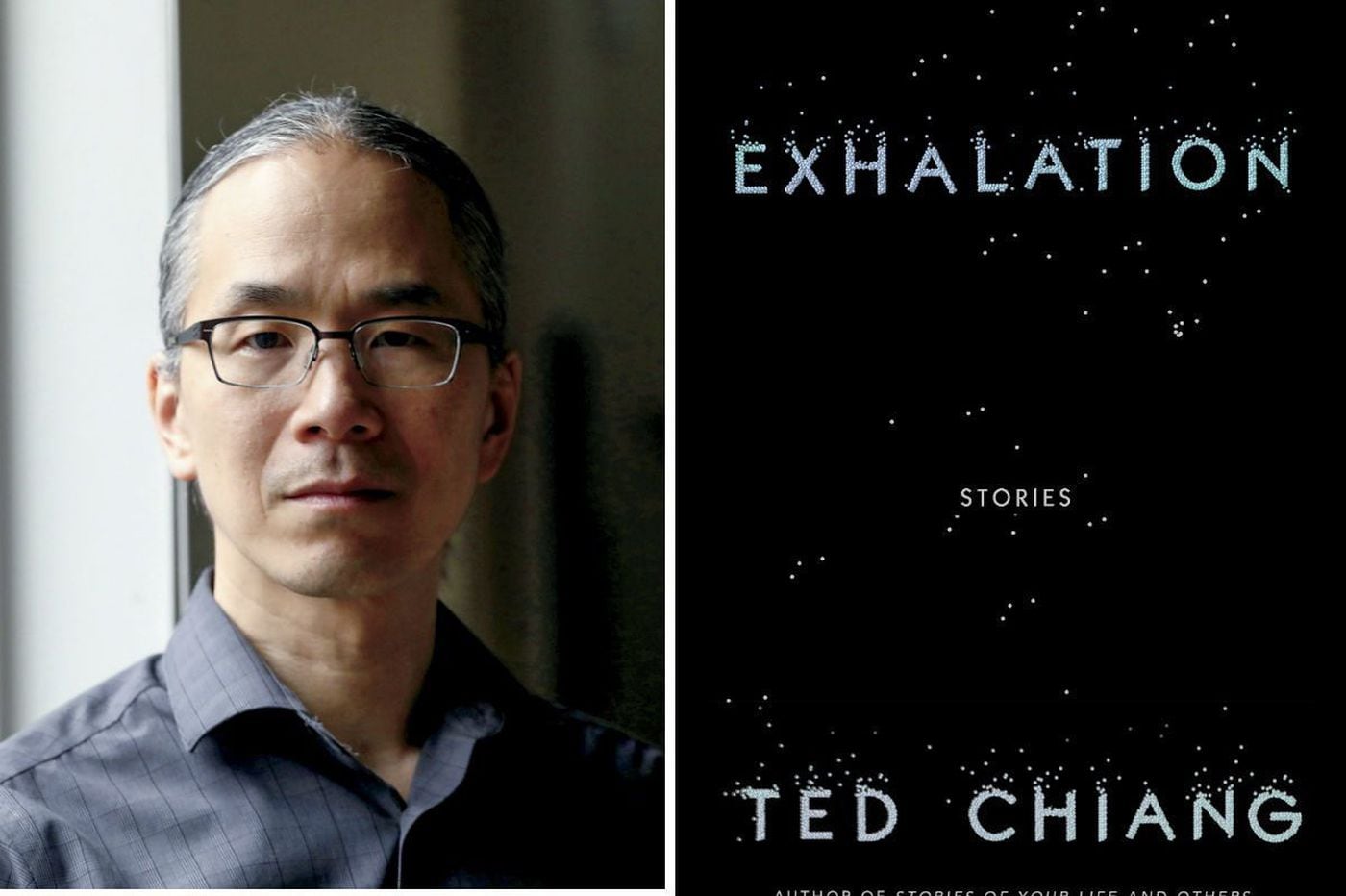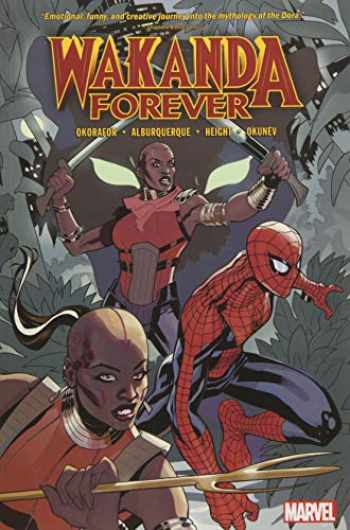English 242: Reading Short Stories
Science Fiction, Fantasy, & Americana
Summer 2021, B-Term
Instructor: Carrie Matthews
Email: crmatthe@uw.edu
Office Hours: Mondays &Tuesdays, 10:30-11:30 (Via phone or Zoom)
or by appointment. Feel free to text me at 206-351-0214.


Ted Chiang Nnedi Okarafor, Wakanda Forever
Texts
All texts are available free online via syllabus urls or posted to our Canvas website. Texts not assigned but mentioned in mini-lectures will be added to the relevant module on Canvas.
Course Overview
Looking at the selection of short stories, with loose weekly foci on science fiction, fantasy, and Americana, I might joke that this course resulted from me watching too many “Black Mirror” episodes just prior to this pandemic. I selected the texts around two concerns: short story authors I wanted you to read, or me to read again, whose texts are available for free; and shared concerns of a sub-genre or theme. The bulk of our texts are of recent or contemporary vintage (20th or 21st century), and most are from the U.S.
This course counts for “W” or writing credit, and I’ve assigned a mix of informal and formal writing. On the informal side, you’ll write weekly reading response questions, reading quizzes, and brief reports of your group’s discussion of the texts, ideas, historical phenomena, and cultural conditions and practices that emerge each week. Your group will have the opportunity to share your observations and facilitate class discussion for a portion of class each Thursday. On the formal side, you’ll write one 6-8 page comparative analytical academic essay that productively brings two or more of the stories we have read into dialogue with one another, and conduct an independent writing project, either alone, with a partner, or in a small group. The independent project can be primarily analytical or creative: you could conduct a research project on an author’s work; you could write your own short story and reflection; you could practice multimodal writing and create a video or a podcast, etc. The independent projects will take varying forms of varying lengths, and I will approve or suggest revisions to your project proposal at the end of Week 2.
Course Goals:
- To help you cultivate a love of reading fiction, if you don’t already have one, or expand that love to include exploring a lot of short stories.
- To help you develop robust close reading or textual analysis practices
- To use writing as a tool for actively reading and exploring short fiction
- To produce independent projects that demonstrate significant learning about what short stories do, how they work, and how we read them.
- To build a functioning intellectual community together despite us never ever actually being in the same room together.
The Remote Class Plan: I think a 2-hour plus Zoom class is brutal, so we will only do that on Thursdays. On Mondays, I will post a discussion board prompt before class, and you’ll have from 12-12:30 to respond. Then we’ll have Zoom class at 12:30. On Tuesdays, I’ll post a reading quiz, and you’ll have from 12-12:30 to complete the quiz before Zoom class. On Wednesdays, you will meet with your group members (4-6 people) from 12-12:30 to share your thoughts on the week’s texts, pick 1-2 passages for the class to discuss, and then each group will meet with me for about 30 minutes to plan what you share/how you will facilitate your portion of class discussion on Thursday. Thursday we will start class at 12 noon. We may end early, but you should plan to block out the full two hours and ten minutes just in case.
Mondays: Reading Response Post to Discussion Board (due by12:30) + Zoom Class, 12:30-2:10
Tuesdays: Quiz (due by 12:30) + Zoom Class, 12:30-2:10
Wednesdays: Group Discussion (12-12:30) + 30-minute Group Conference (times will vary by group)
Thursdays: Zoom Class with Group Reading Discussion Reports & Discussion Facilitation, 12 noon-2:10
Class Community Norms
Respect for Difference & Learning: For us to achieve the intellectual vibrancy diversity produces, we have to be open to learning how others see and move through the world, and we have to respect everyone's experiences. We should also recognize that some people's ways of seeing and experiencing the world have been privileged, while others have been marginalized, disparaged, and sometimes met with outright violence. We should attend to that in our written and oral commentary by engaging difference with openness to learning and awareness of power dynamics. I expect each of us to help build a class community where sexist, racist, homophobic, transphobic, and ableist language and action are not welcomed so that all members of our class can be welcomed.
Sharing Writing: Our course includes weekly reading response posts to the discussion board, and you will be spend some time reading and responding to one another’s writing/ideas. Hopefully this goes without saying, but at the risk of redundancy, I’ll say (well, write) it: treat everyone and everyone’s work in this class with respect. In particular, when we discuss informal writing, focus on responding to ideas, and if you have a critique, remember that you’re critiquing the draft in front of you, not the writer. Please respect the parameters of our learning community and do not share your classmates’ writing with people outside the course unless you have their permission to do so in writing.
Assessment: I will use a grade contract rather than traditional grading to assess your work in this course. There’s a long story behind this, but basically, a colleague who used to direct writing at UW Tacoma (and who is a major scholar—Asao Inoue if you want to look him up) convinced me that traditional grading of writing is racist, and I already didn’t like it because I mostly felt it just rewarded people like me and unfairly penalized a lot of other students simply on the basis of difference. My family was poor until I was 8, as in my Mom sewed my clothes and eating at McDonalds was a treat, but I had a super-privileged upbringing once my dad got a good job with the State Department. My dad has a PhD, and my mom a BA. And I got to travel, and there were lots of books. And, oh yeah, I’m white and cishet. So my home culture was very, very close to U.S academic culture, which made it easy to succeed and ace classes. And none of that speaks to what should matter: learning. I often just performed what I already knew and did fine, and I saw a lot of people having to totally adjust to a new culture who were as smart/hardworking as me or smarter/more hardworking who got lower grades. So I really don’t have a lot of faith that traditional grading systems for writing are just.
The contract should lessen any anxiety you might about grades or having to write primarily to please me. I’ll go over the grade contract on our second day of class. You will have the chance to decide one of the course tasks yourself so that you can design at least a part of your work in this class to reflect your own learning goals.
Assignments:
- Weekly Reading Responses on the discussion board (Mondays)
- Weekly Reading Quizzes (Tuesdays)
- Group planning & conferences (Wednesdays) & Partial class facilitation (Thursdays)
- Comparative Analytical Essay (1250-1750 words) bringing two short stories into dialogue (due Wednesday, 8/11, by midnight)
- One task you assign yourself (due the last day of class, by midnight)
- Independent Project & Reflection (due Friday, August 20th)
Nuts and Bolts
Paper Format: Unless an assignment specifies otherwise, please submit all papers in 11- or 12-pt. Times New Roman font, double-spaced, with one-inch margins. Include your name, the date, and a title at the top of the first page: you don’t need a title page.
Plagiarism: Don’t do it! If you ever have questions about documentation, please come see me—I’m happy to help answer questions and share strategies for avoiding plagiarism. I do expect your words and the ideas they express to be your own except when you clearly signal and name another source.
ACADEMIC RESOURCES & SUPPORT:
Accommodations: Please let me know if you need accommodation of any sort. I am happy to work with the UW Disability Resources for Students Office (DRS) to provide what you require, and I am very willing to take suggestions specific to this class to meet your needs.
If you have already established accommodations with Disability Resources for Students (DRS), please communicate your approved accommodations to me at your earliest convenience so we can discuss your needs in this course.
If you have not yet established services through DRS, but have a temporary health condition or permanent disability that requires accommodations (conditions include but not limited to; mental health, attention-related, learning, vision, hearing, physical or health impacts), you are welcome to contact DRS at 206-543-8924 or uwdrs@uw.edu or disability.uw.edu. DRS offers resources and coordinates reasonable accommodations for students with disabilities and/or temporary health conditions. Reasonable accommodations are established through an interactive process between you, your instructor(s) and DRS. It is the policy and practice of the University of Washington to create inclusive and accessible learning environments consistent with federal and state law.
Religious Accommodations: “Washington state law requires that UW develop a policy for accommodation of student absences or significant hardship due to reasons of faith or conscience, or for organized religious activities. The UW’s policy, including more information about how to request an accommodation, is available at Religious Accommodations Policy (https://registrar.washington.edu/staffandfaculty/religious-accommodations-policy/). Accommodations must be requested within the first two weeks of this course using the Religious Accommodations Request form (https://registrar.washington.edu/students/religious-accommodations-request/).”
I’m required to include the language above by (new) law in Washington. Basically, if any class demands conflict with a religious observance for you, I am happy to work with you. Please just let me know early in the quarter.
Writing Centers
Wherever you fall on the spectrum of writing in this course— whether you are struggling with a writing assignment or seeking to “reach the next level”— take advantage of the UW’s writing centers. It’s valuable to get the perspective of someone outside the course (especially someone with expertise in producing academic writing). UW’s writing centers are free for students and provide individual attention from trained readers and writing coaches. This quarter they will offer remote writing appointments.
The Odegaard Writing and Research Center (OWRC) offers free, one-on-one help with all aspects of writing at any stage in the writing process. You can consult with a writing tutor at any stage of the writing process, from the very beginning (when you are planning a paper) to near the end (when you are thinking about how to revise a draft to submit to your instructor). To make the best use of your time there, please bring a copy of your assignment with you to your online session. While OWRC writing consultants are eager to help you improve your writing, they will not proofread your paper. Available spots are limited, so book your appointments early! Reserve appointments online at http://depts.washington.edu/owrc/ .
You can also try out the CLUE Writing Center. CLUE is a first-come, first-served writing center. To learn more and make an appointment, visit http://depts.washington.edu/clue/dropintutor_writing.php
Confidentiality: Barring an imminent threat, I will not discuss you or your performance in this class with third parties outside the University of Washington unless you instruct me to do so and sign a consent form. FERPA (the Family Education Rights and Privacy Act) prevents me from legally disclosing student information to third parties without a release signed by you. And even if a third party (a potential employer, a government agency, etc.) contacts me for information about you and has a consent form that you have signed, I will still refrain from providing information unless you have given me a written request (email is fine). So: if you would like me to respond to queries about you from a potential employer or anyone else, you should do two things: 1) fill out and sign a release form (one the third party provides or the UW's own, found at http://www.washington.edu/students/reg/ferpafac.html); and 2) email me a request to talk with this third party, giving me a sense of the context (recommendation? background check?) and of any information I should be sure to reveal or not reveal.
Q Center
The University of Washington Q Center is a fierce, primarily student run resource center dedicated to serving anyone with or without a gender or sexuality – UW students, staff, faculty, alum, and community members. We host and support student groups, put on regular programming events, house a lending library, and amplify student voices on our Student Blog. Explore their website for more information: http://depts.washington.edu/qcenter/wordpress/
For Students with Children
I hear quality child care is tough to find and afford in Seattle. And now we’re sheltering in place. If you have young children, a) good luck maintaining your sanity, let alone getting any work done; 2) let me know what accommodations you need; and 3) mute yourself on Zoom when you’re not speaking if you’ve got the kids with you.
Voter Registration
You can register to vote online or by mail until 8 days before an election or in-person through Election day. Registrations done by mail need to be received, not postmarked, by the 8-day deadline.
Out-of-state students may register to vote in Washington if you have lived in the state for at least 30 days and have established a residential address in the state.
For more information, check out
See https://www.kingcounty.gov/depts/elections/how-to-vote/register-to-vote.aspx
Course Calendar & Texts
Th, 7/22: Course Introduction & Introduction to Close Reading. Lydia Davis, “The Mother” (this is a piece of very short ‘flash fiction’ that we will read together in class)
Week One: Practices of Close Reading Short Stories
M, 7/26 Haruki Murakami, “On Seeing the 100% Perfect Girl One Beautiful April Morning”
Critical Reading: Jonathan Culler, “The Closeness of Close Reading”
http://www.mrshaughaboo.com/uploads/1/8/9/5/18950307/8.culler_on_close_reading.pdf
*Reading Response Post*
T, 7/27 On Irony: Guy de Maupassant, “The Necklace”
https://fac.ksu.edu.sa/sites/default/files/the_diamond_necklace.pdf
Kate Chopin, “The Story of An Hour”
https://archive.vcu.edu/english/engweb/webtexts/hour/
*Reading Quiz*
W, 7/28 Unreliable Narrators, Part 1: Edgar Allan Poe, “The Black Cat”
https://poestories.com/read/blackcat
*Group Meeting & Conference with me*
Th, 7/29 Unreliable Narrators, Part 2: Charles Baudelaire,
“The Rope”
https://exchanges.uiowa.edu/issues/estranged/the-rope/
and “Beat Up the Poor!”
http://baudelairepoems.blogspot.com/
*Submit Grade Contract by 12 noon Friday*
Week Two: Science Fiction
M, 8/2 Isaac Asimov, “Nightfall” https://sites.uni.edu/morgans/astro/course/nightfall.pdf
Critical Reading: Leah Zaidi, “Worldbuilding in Science Fiction, Foresight and Design”
https://jfsdigital.org/wp-content/uploads/2019/06/03-Zaidi-Worldbuilding.pdf
*Reading Response Post*
T, 8/3 Octavia Butler, “The Book of Martha”
*Reading Quiz*
W, 8/4 Ursula K. Le Guin, “The Ones Who Walk Away From Omelas”
https://www.utilitarianism.com/nu/omelas.pdf
*Group Meeting & Conference with me*
*Independent Project Proposal Due*
Th, 8/5 N.K. Jemisin,"The Ones Who Stay and Fight"
http://www.lightspeedmagazine.com/fiction/the-ones-who-stay-and-fight/
Week Three: Fantasy
M, 8/9 Ted Chiang, “Exhalation”
http://www.lightspeedmagazine.com/fiction/exhalation/
Critical Reading: Hatice Eşberk, “The Function of Fantasy as a Subversive Genre in Literature” (Posted on Module 3 on Canvas as a pdf file)
*Reading Response Post*
T, 8/10 Nnedi Okorafor, “Spider the Artist”
http://www.lightspeedmagazine.com/fiction/spider-the-artist/
*Reading Quiz*
W, 8/11 N. K. Jemisin, “The City Born Great”
https://www.tor.com/2016/09/28/the-city-born-great/
*Group Meeting & Conference with me*
*Comparative Analytical Essay Due*
Th, 8/12 Daisy Johnson, “A Bruise the Size and Shape of a Door Handle” (includes audiorecording of a reading)
http://americanshortfiction.org/new/bruise-size-shape-door-handle/
Week Four: Americana
M, 8/16 Tommy Orange, “The Team” (also posted as a docx under "WEEK 4: Monday" Module)
https://www.nytimes.com/interactive/2020/07/07/magazine/tommy-orange-short-story.html
Brief interview with Tommy Orange on the PBS Newshour
https://www.youtube.com/watch?v=JXCbmuIFD8M
*Reading Response Post*
T, 8/17 Toni Morrison, “Sweetness”
https://www.newyorker.com/magazine/2015/02/09/sweetness-2
Critical Reading: Sandy Grande, “Refusing the University”
https://www.uvicfa.ca/wp-content/uploads/2020/11/Refusing_the_University.pdf
*Reading Quiz*
W, 8/18 Viet Thanh Nguyen, “Fatherland”
https://vietnguyen.info/wp-content/uploads/2013/07/NguyenViet_Fatherland.pdf
Short film “American Refugee”
https://www.youtube.com/watch?v=maFi7OMfg7A
Recommended: “The Donut King” (available on Hulu [free to subscribers], Amazon Prime, and Youtube (for rental)
*Group Meeting & Conference with me*
Th, 8/19 Celeste Ng, “Girls, At Play”
https://blreview.org/fiction/girls-at-play/
